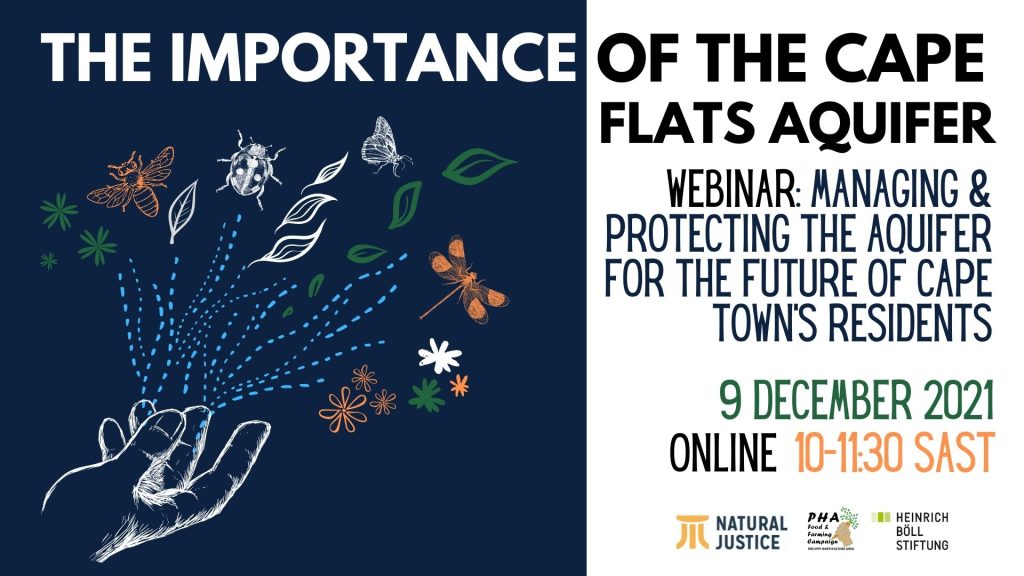Please join the PHA Food and Farming Campaign, Heinrich Böll Foundation and Natural Justice on the 9 December from 10-11:30 am as various academics, lawyers and experts present on the Cape Flats Aquifer.
The aim of the webinar is to 1) increase the understanding of the Cape Flats Aquifer and its contribution to water security in Cape Town; 2) share information on the Managed Aquifer Recharge Programme; 3) indicate how the Aquifer can be protected; and 4) show why it is important for the human rights of Cape Town residents.
The session will be facilitated by PHA Campaign supporter, Marthan Theart
- Speakers include: Carin Bosman (Sustainable Solutions)
- Candice Lasher (City of Cape Town)
- Dr Kevin Winter (UCT)
- Allan Basajjasubi (Natural Justice)
***
Register in advance for this webinar:
https://us06web.zoom.us/webinar/register/WN_b_RNHyZuSFOtL3cTfifMrg
After registering, you will receive a confirmation email containing information about joining the webinar.
The Cape Flats Aquifer
The “Cape Flats Aquifer” in Cape Town covers a surface area of 630 km2 and stretches from False Bay to the Tygerberg Hills and Milnerton. This is an extraordinary and critical natural phenomenon – and it is important to mobilise community support for its protection.
Despite its size and importance, many people living in Cape Town are not aware of it. It is important to raise awareness of its centrality, size and contribution to local food and water security. For example, many people may not know that the Philippi Horticultural Area (PHA) lies on top of the deepest section of the aquifer, taking advantage of its “drought-proof” nature. The PHA provides fresh produce to the people of Cape Town and can continue to do so, even in difficult drought conditions.
We are calling for people to support its protection. Given climate change impacts expected in the future, including further droughts, the aquifer will be critical to the future of Capetonians – as a source of water, food and job creation. The aquifer also contributes to climate resilience: it mitigates climate change by absorbing carbon into the soil, its geology prevents flooding and it contains critical spaces of biodiversity.
The City of Cape Town local government is already aware of the aquifer’s potential in terms of contributing to water security in Cape Town – augmenting current supplies and, it is hoped, ensuring that a future “day zero” is avoided.
Why are we calling to protect it?
The aquifer is under threat. Not only is it currently being polluted and degraded, but threats to the Philippi Horticultural Area in the form of mining and development will impact the ability of the land to recharge the water, and will contribute further pollution to the aquifer.
The aquifer is crying out to be seen and heard. We want people to come together to support its protection. We need to protect the aquifer from development that paves over the agricultural land, reduce illegal activities which undermine it, address pollution and contamination and call for the Philippi Horticultural Area to be assigned “protection status”.
By celebrating the aquifer as a natural, cultural and future resource, we hope to honour its voice. After all, because of the aquifer, everything we need is right here.

